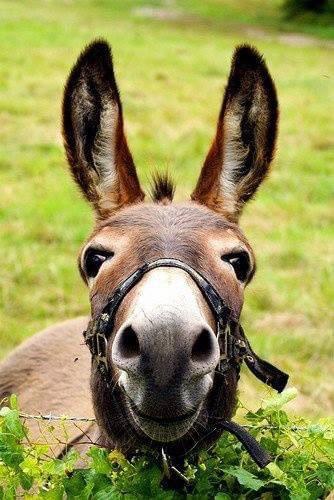Besnoitiosis is a rare parasite that causes cystic lesions on the skin and in the throat and eyes
Besnoitiosis is a rare parasite that causes cystic lesions on the skin and in the throat and eyes. There are no effective treatments.
Jennies can sometimes cycle all year, and have a 12-14 month gestation period, compared to 11 months for horses.
Jacks should be gelded to help prevent aggressive tendencies. Their blood vessels to the testicle are larger than horses and may require ligation.
Some donkeys get coronary band lesions resembling an abscess eruption.
Dental care is similar to horses, but some donkeys develop a longer lower jaw, causing the lower incisors to protrude further than the upper incisors.
Donkeys develop more slowly than horses. The carpal growth plates do not close until they are at least four years old. They should not be used to pull heavy loads until they are skeletally mature.
Donkeys do not fatigue as easily as horses. The do not sweat or lose water as readily.
Hyperlipemia is more common in donkeys, especially if they are obese. This is a disorder where lipids in the blood stream overwhelm the liver’s capacity to remove them. This can occur during times of stress (illness) or feed deprivation. They will become lethargic, weak, anorexic, and have diarrhea. This is a life-threatening disorder, and any donkey that does not eat for a couple of days should be examined by a veterinarian.
Jack sores come from stable and house flies that transmit Habronema spp. which linger around the mouth, causing sores and irritation. They are quite itchy and difficult to get to heal.
Laminitis is inflammation of the sensitive laminae in the hoof, holding the hoof to the bone. It is more likely to occur in all four feet than in horses. Because they are more stoic animals, it is likely to be overlooked.
Donkeys are the primary host for lunworms; Dictyocaulus arnfeldi. This parasite completes its life cycle in donkeys, but rarely reproduces in horses. They will cough and breathe harder and possibly wheeze. Secondary bacterial infections may occur. This parasite is killed with avermectin type deworming.
Donkeys require fewer calories and less protein compared to horses. When over fed, they will founder and become obese. They require higher amounts of anesthetics.
Donkeys have smaller nasal passageways than horses. They are more prone to pharyngeal collapse. The trachea may also collapse, causing dyspnea, or difficulty breathing.
Pain tolerance is high in donkeys. This makes diagnosis of musculoskeletal disorders and also those of the gastrointestinal system more challenging. They may be near death before they show symptoms.
Donkeys are more prone to sarcoid tumors. Treatment of sarcoids is challenging, involving local chemotherapy, removal, and radiation therapy.
Fox Run Equine Center

